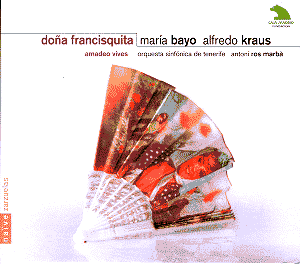This
2 CD set is a French re-release of an Auvidis recording.
Those
interested in opera and operetta sometimes turn a musical corner
to come across an unexpected and welcome surprise. This is the
case with Doña Francisquita. If a recording is to
feature as one of the best, most original recordings then this
is surely one. Some of the tracks are stunning, both a delight
to listen to musically and in performance.
The
zarzuela (a Spanish form of light operetta with music, song and
dance) originated at the Palace of La Zarzuela, near Madrid, where
musical fiestas were regularly held in the 17th Century.
The fashion for stage zarzuelas, which were often satirical in
nature, grew in the mid-19th Century with composers
like Arrieta, Barbieri, Bretón and Giménez, some
of whose works already feature in the international CD catalogue.
Of its genre this work by Vives is a particularly high-class example.
Until
now Vives as a composer has been unknown to me. Sadly little about
his musical background is contained in the notes. We are told
about his love of Catalonia and that he was Professor of Composition
at the Madrid conservatory. He had an accident which caused semi-paralysis
but the conservatory gave him assistance to complete the composition
of the score. To what extent this help was made is unclear. We
do know that Vives often insisted on writing the music before
getting the lyricists to work out the words. Since he was Professor
of Composition we can understand why the score contains such bright
and catchy music with excellent orchestral texture. His score
contains a wealth of musical ideas that turn in unexpected directions
with temporary changes of key.
The
plot concerns a love affair between a student, Fernando, and the
'Francisquita' of the title. Although loved by Francisquita, Fernando
ignores her advances, preferring to think he is in love with an
actress from La Cruz Theatre. Humour presents itself when Francisquita
is wooed by the student's father in front of her mother, where
the mother mistakenly believes that it is she who is being wooed.
Francisquita pretends to accept the elderly man's advances to
make his son, her hopeful lover, jealous and win her affections.
Another triangle exists where the actress taunts her other admirer,
Lorenzo. A carnival follows where the actress sings a spirited
pasacalle. This carnival proceeds across Act 2 and into Act 3,
giving Vives an excuse to introduce some spectacular music. An
amount of deception and double-dealing follows. All is resolved
when the old man realises that he is too old as a match for Francisquita
and so believes that his son should marry the girl instead. In
the finale they all celebrate the forthcoming wedding.
Vives'
score is fresh and exciting, full of colour and the music flows
well. He has an excellent feel for harmony and rhythm, providing
subtle changes of key to add interest. Interestingly, the opening
scene is musically of a different style being through-composed.
One could be forgiven for thinking it carries more than a passing
likeness to a passage by Puccini.
After
the lengthy tr.1 a brightness unfolds and a more typical zarzuelan
energy starts to flow with lighter, more frothy, material. Many
of the songs are charming and bounce along with plenty of colour.
The orchestral forces are sumptuous and provide delightful decoration
to the melodic lines. Listen to the first two minutes of CD1 tr.3,
with its zithering mandolin opening. It is distinctively Spanish
in rhythm and gathers momentum with interesting undercurrents
in the bass line. In contrast, the dreaming waltz tune (CD2 tr.5)
with humming woodwind/violas is unusual and also excites the listener.
The
performance owes much of its strength to the excellent soloists,
a good chorus and Antoni Ros-Marbá's vivacious direction.
Alfredo Kraus is an experienced operatic tenor who needs no introduction.
He is on good form, singing with substantial heft commanding a
considerable presence. Many of the other names are not so well
known outside Spain. Of them, Maria Bayo is a light lyrical soprano,
well suited to the role of Francisquita with her delightful bell-like
timbre and good vocal expression. Alfonso Echeverria is a smooth
and resonant bass while Santiago Jerico, a pleasant high light
tenor with good voice, tends to be uneven when singing stretched
phrases and lacks the necessary breath control.
The
recording is outstandingly good with optimum balance between soloists
and choir, and choir and orchestra. The acoustics are superb and
give a particularly fine resonance to the brass. The notes, however,
do not always focus on matters that would be of most interest
to the reader: they certainly dwell too much on a differentiation
between the three act zarzuela (great genre) and one act zarzuela
(small genre). There is a full libretto of the work with stage
directions in Spanish, French, English and German. The notes also
refer to the CDs by the number 4710, which might be the number
of the original issue.
Raymond
J. Walker
You
might also be interested in The Zarzuela Companion by Christopher
Webber
